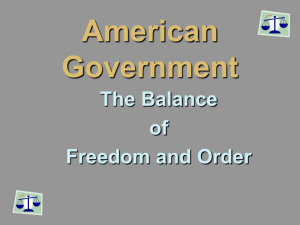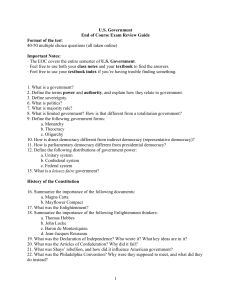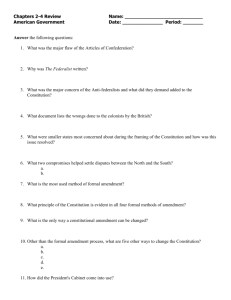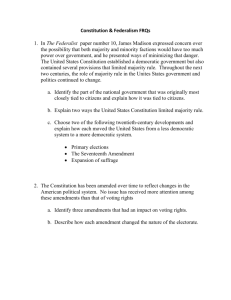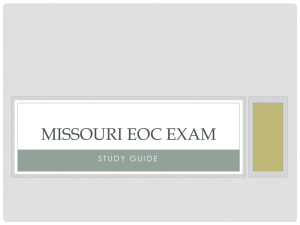American Government - Hatboro
advertisement
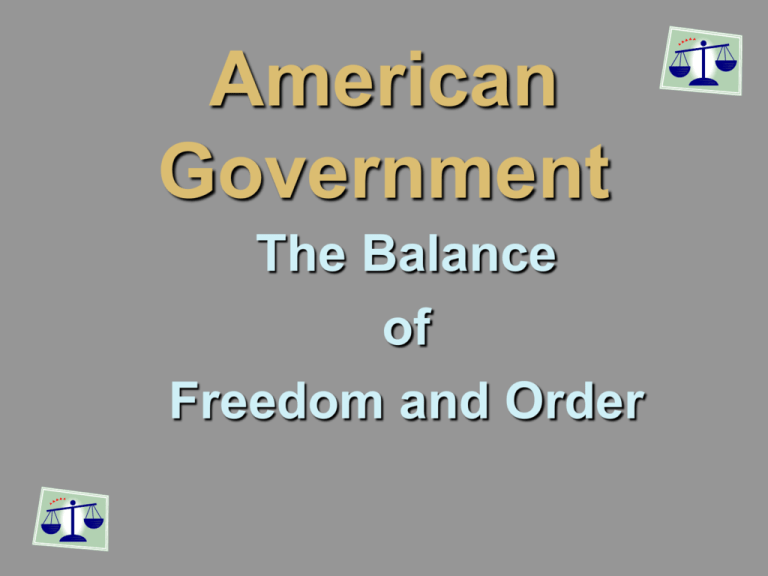
American Government The Balance of Freedom and Order FREEDOM The Declaration Of Independence JEFFERSONIAN ORDER The ORDER Constitution MADISONIAN 1791 WHAT IS THE MAIN PURPOSE OF GOVERNMENT? To maintain the balance of freedom and order! CORE PRINCIPLES CIVIC VIRTUE A person looks out for the common good POPULAR SOVEREIGNITY The people are the highest authority; “We the people, ….” REPRESENTATIVE DEMOCRACY REPUBLIC We elect leaders to speak on our behalf PLURALISM Diversity People are allowed and We ARE a nation encouraged to be of Immigrants! different NATURAL RIGHTS Inalienable Rights Rights for all humans at 1948 UN passed the John Locke birth(1600s) : Universal Declaration of Life, Liberty, and Property Human Rights which you are born with these officially extended natural rights rights to all SOCIAL CONTRACT The government will Contract/Agreement protect that must be JUST AND the rights of MUTUAL the people and the people will obey the government’s laws. CORE DOCUMENTS Declaration of Independence Written by Thomas Jefferson on July 3, 1776 The USA formally expressed their status as a free and independent state, no longer colonies of Great Britain Articles of Confederation Original explanation of the government and law before the Constitution was adopted Supreme law from 1781-1789 CONSTITUTION: Fundamental law and structure of the US government. Framed 1787, ratified 1789 amended variously since. ***Treason only crime dealt with in original! BILL OF RIGHTS First 10 amendments to the Constitution, added in 1791 to protect certain essential rights to citizens. FEDERALIST PAPERS Series of essays written by supporters of ratification of the Constitution to convince others of its worth. 6 Goals of Constitution To form a more perfect union Establish justice Ensure domestic tranquility Provide for the common defense Promote the general welfare Secure the blessings of liberty 3 Branches of WHY DID THE FOUNDING FATHERS SEPARATE THE POWERS OF GOVERNMENT? Legislative Branch of Government BICAMERAL SENATE AND HOUSE OF REPRESENTATIVES State Representatives… Serve 2 year terms Qualifications??? a. at least 25 years old b. a US citizen for 7 years c. reside in state elected from 435 members Representation based on state population http://www.legis.state.pa.us/WU01/VC/visitor_info/our_house/who.htm State Senate serve 6 year terms Qualifications???: Can you name the 2 a. at least 30 years old PA State Senators? b. US citizen for 9 yrs c. must live in state elected from Pat Toomey and Robert Casey 50 members Vice President How does a bill become a law? Let’s watch this short and find out! http://www.teachertube.com/view_video.ph p?viewkey=4bd0cf05c37c246f215f So, let’s talk about the process of a bill becoming law… CONGRESSIONAL POWERS Makes Laws Establish budget Declare war Impeach Approve presidential appointments Ratify Treaties Executive Branch of Government Electoral College (NOT Popular Vote) Qualifications??? a. 35 years old b. Natural born citizen c. live in the US for 14 consecutive years Who assists the president in the decision making process? The Cabinet Can you name any members of The current Cabinet??? The Vice President Joe Biden Department of Homeland Security Secretary Jeh Johnson Department of State Secretary John Kerry Department of the Treasury Secretary Jack Lew Department of Defense Secretary Chuck Hagel Power & Responsibilities of the President Chief Executive--enforce laws Commander in Chief of Military Controls US Foreign Policy Indirect legislative powers Indirect Judicial Powers (suggestions…influence) (Appoints Justices) Chief of State What qualifications do YOU think a future president should have? Judicial Branch of Government INNOCENT UNTIL PROVEN GUILTY! 9 members of the Supreme Court Currently Appointed Judges: CHIEF JUSTICE -- John Roberts Clarence Thomas Antonin Scalia Anthony M. Kennedy Ruth Bader Ginsburg Sonia Sotomayor Stephen Breyer Samuel Alito Jr Elena Kagan Establish Uniformity in the law (Between States) Address a relevant issue (Constitutionality of laws and their implementation) Judicial Review: 1803 Allows the Supreme Court to declare laws or executive actions unconstitutional or illegal Habeas Corpus: “Bring the body” one CAN NOT be held in jail WITHOUT a BODY of EVIDENCE presented against them Do you know of any famous Supreme Court decisions? Serve life terms to remove them from campaigning (Constitution over popularity) When does a president assume more control of the government and the system of checks and balances becomes suspended? War or State of Disaster CIVIL LIBERTIES/RIGHTS Rights or privileges guaranteed to United States Citizens under the Constitution 1st Amendment - Freedom of… SPEECH Includes expression and lifestyle RELIGION Protects minority religions PRESS An informed public is better able to make decisions nd 2 Amendment The Right to Bear Arms Private citizens can own guns th 4 Amendment Protects against unjust arrest illegal searches or seizures excessive bail Police need a warrant unless there is a probable cause *** Different rules in SCHOOL!!! 5th and 6th Amendments Establish Due Process Due Process “Innocent until proven guilty” Protects the rights of the ACCUSED No Self-Incrimination Right to an Attorney Right to a speedy, public trial 8th Amendment Protects against excessive use of What is cruel or unusual punishment??? power No Cruel or Unusual punishment No torture! CIVIC RESPONSIBILITIES 1. TAXES: LOCAL property taxes Police, sewage, community events, etc. 85% funds education STATE- communication/transportation systems, state parks/reserves/police, recreation,higher education (state schools), prison system FEDERAL-Defense: FBI, CIA, Armed Forces Welfare, salaries of gov’t employees, national parks 2. POLITICAL PARTICIPATION & VOTING Apathy is the enemy of democracy Why do people choose not to vote? 3. 4. ABIDE BY LAWS: What laws do we break? What laws do we view as flexible? MILITARY SERVICE: Draft OR Volunteer OR Conscientious Objector 5. Volunteer: Freedom from heavy government civic virtue=participation and support Virtuous Institutions Religious Institutions Volunteer firemen Red Cross ACTIVISM METHODS: Speeches Editorial letters Songs Demonstrations Marches and Boycotts Terrorist attack Revolution Mutiny Riot Strike/Work Struggle Famous American Activists: Martin Luther King, Jr. Eleanor Roosevelt Woody Guthrie Harriet Tubman Upton Sinclair Dorothea Lange Thomas Nast John Muir Cesar Chavez Mary “Mother” Jones John Scopes Elizabeth Cady Stanton and Susan B. Anthony ACTIVIST ORGANIZATIONS KKK ADL Nat’l Org. of Women Sierra Club Black Panther Party SNCC PETA ACLU NAACP Amnesty International Christian Coalition Bill of Rights 2nd Amendment: The Right to Bear Arms 3rd Amendment: Prohibits quartering troops Trials between private parties include juries 9th Amendment: Unenumerated Rights Gov’t may not require citizens to house US troops 7th Amendment: Juries for civil trials Citizens may own guns People have rights that are not expressly listed 10th Amendment: Reserved Powers Powers not delegated to Federal gov’t are reserved to the states
